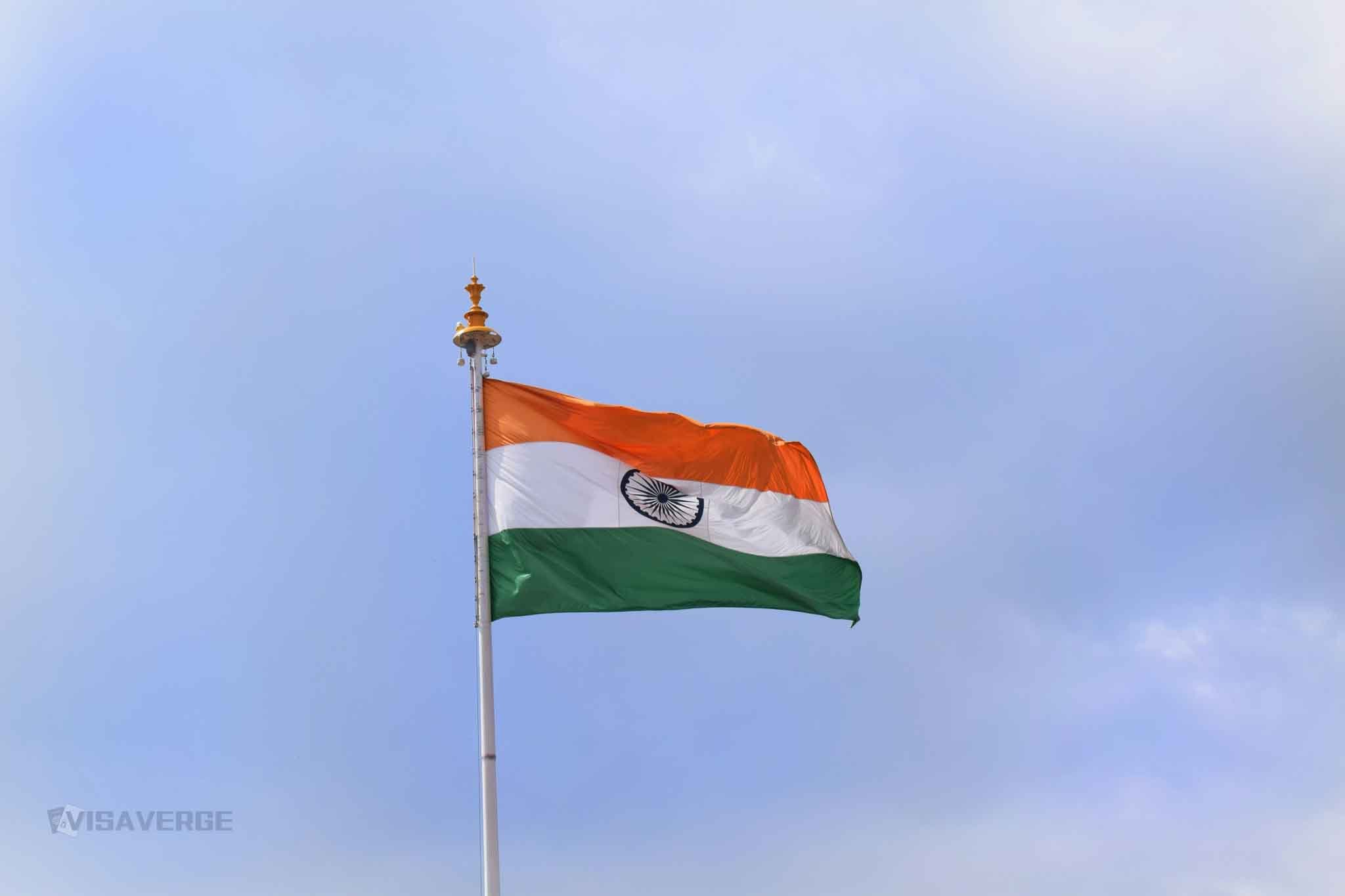Key Takeaways
• Attorney General can revoke Green Cards anytime, even 10-20 years after issuance, per May 2025 DOJ statement.
• Over 1.2 million Indians face up to 50-year waits for employment-based Green Cards under new uncertain policies.
• New ‘Catch-And-Revoke’ policy enables immediate Green Card revocations for minor violations, risking seniors and families.
The U.S. Department of Justice Expands Powers to Revoke Green Cards: What It Means for Indian Holders
On May 19, 2025, a major shift in United States 🇺🇸 immigration policy came to light. During a hearing before the Third Circuit Court of Appeals, a U.S. Department of Justice attorney declared that the Attorney General could revoke a person’s Green Card at any time—without any time limit. This new stance, if upheld, could affect millions of immigrants, especially Indian holders who already face some of the longest waits for permanent residency in the country.

What Happened and Why It Matters
The statement from DOJ attorney Lindsay Murphy was clear: the Attorney General has the power to take away a Green Card “even 10, 20 years later.” This came up in a case involving an immigrant named Qatanani. The judges on the panel, including U.S. Circuit Judge Arianna Freeman and U.S. Circuit Judge Cheryl Ann Krause, pushed back. They questioned whether there should be any limit on how far back the government can go to review and possibly cancel someone’s Green Card.
Just a few days later, on May 23, 2025, more details emerged about a proposed rule that would allow Green Cards to be revoked at any time. This new approach creates a level of uncertainty that has never existed before for immigrants who have built their lives in the United States 🇺🇸.
The New “Catch-And-Revoke” Policy
The Trump administration has rolled out a “Catch-And-Revoke” policy. Secretary of State Marco Rubio announced that the government will act to revoke the status of any non-citizen who breaks U.S. laws. His message was blunt: “Whenever the government catches non-US citizens breaking our laws, we will take action to revoke their status. The era of abusing our nation’s generosity is over.”
On May 1 and 2, 2025, the United States Citizenship and Immigration Services (USCIS) posted warnings on social media. They stated, “Green cards and visas will be revoked if an alien breaks the law,” and “Having a visa or green card is a privilege that can be taken away.” This marks a clear shift from previous policy, where Green Card holders could often challenge the cancellation of their residency or fix minor violations.
Now, under the new approach, revocations could happen immediately and may be much harder to contest.
How Many People Are Affected?
The numbers are staggering. There are about 12 million permanent legal residents in the United States 🇺🇸. Indian nationals are among the most affected:
- Over 1.2 million Indians are waiting for employment-based Green Cards.
- 609,222 are primary applicants.
- 650,221 are dependents (spouses and children).
- The backlog is split into three main categories:
- EB-1 (Extraordinary Ability): 51,249 primary applicants and 92,248 dependents (143,497 total)
- EB-2 (Advanced Degree): 419,392 primary applicants and 419,392 dependents (838,784 total)
- EB-3 (Skilled Workers and Professionals): 138,581 primary applicants and 138,581 dependents (277,162 total)
Because of per-country limits, Indian holders can face wait times of up to 50 years for employment-based Green Cards. This new policy adds even more uncertainty for those who have already waited so long.
Who’s Involved? Key Stakeholders and Their Views
Government Officials
- Attorney General Pam Bondi leads the U.S. Department of Justice and is at the center of this expanded authority.
- Secretary of State Marco Rubio has made it clear: “No one has a right to a green card.” He added, “If you do it once you get in, we’re going to revoke it and kick you out.”
- Vice President JD Vance has said, “For a green card holder, even if I might like that green card holder, he does not have an indefinite right to be in the United States of America.”
Legal Experts
- Amelia Wilson, Assistant Professor at Elisabeth Haub School of Law, points out that the Department of Homeland Security cannot simply “revoke” a permanent resident’s status. The government must prove, with strong evidence, that the person should lose their status.
- Bradford Bernstein, an immigration lawyer, warns that this policy could weaken due process rights for foreign nationals.
- David Bier, Director of Immigration Studies at the Cato Institute, says, “Wealthy, skilled people with other options will not settle in a country where their lives can be ruined for a speeding ticket or operating an illegal lemonade stand.”
- Ashwin Sharma, a Florida-based immigration attorney, has seen elderly Indian Green Card holders threatened with expulsion.
- Greg Siskin, co-founder of Siskin Susser Immigration Law Firm, advises Green Card holders not to surrender their cards under pressure, reminding them that everyone is entitled to a hearing before a judge.
What Are the Legal Grounds for Revoking a Green Card?
Traditionally, the government could revoke a Green Card for reasons like:
- Being convicted of serious crimes (aggravated felonies, drug offenses, or fraud)
- National security concerns, such as ties to terrorist groups
- Violating immigration laws
The new policy appears to expand these reasons to include:
- Problematic social media posts
- Minor legal infractions, such as traffic violations
- Long absences from the United States 🇺🇸
This means that even small mistakes or misunderstandings could put someone’s permanent residency at risk.
How Does the Revocation Process Work?
Normally, the process starts when the Department of Homeland Security believes someone has broken immigration laws. The Green Card holder receives a Notice to Appear in immigration court. In serious cases, the person may be arrested and detained.
However, there are reports of new, troubling practices:
- Elderly Indian Green Card holders have been pressured at U.S. airports to “voluntarily” give up their residency by signing Form I-407 (official government link).
- Those who refuse to sign face threats of detention or removal.
- During the previous Trump administration, officials reportedly handed out Form I-407 on airplanes, pressuring travelers to give up their Green Cards mid-flight.
Why Are Indian Green Card Holders Especially at Risk?
Indian nationals face unique challenges:
- Huge Backlog: The employment-based Green Card system has a massive backlog for Indian holders, leading to decades-long waits.
- Frequent Travel: Many elderly Indians spend winters in India, which now puts them under more scrutiny when they return to the United States 🇺🇸.
- Risk of “Abandonment”: If a Green Card holder stays outside the United States 🇺🇸 for more than 180 days, they may be accused of abandoning their residency.
Ashwin Sharma, the Florida-based attorney, notes that these new pressures are causing real fear among Indian families, especially those with elderly parents who travel often.
What Do Legal Experts Say About This Policy?
Many legal experts believe the new policy goes against established immigration law. Here’s why:
- The idea that the Attorney General can take away Green Cards at any time, for any reason, is not supported by current law.
- Immigration judges—not the Attorney General or the Department of Homeland Security—have the final say on whether someone loses their Green Card.
- The government must give notice and a hearing, and must prove with “clear, unequivocal, and convincing evidence” that the person should lose their status.
According to analysis by VisaVerge.com, these changes could make permanent residency in the United States 🇺🇸 feel much less secure, especially for Indian holders who have waited years or even decades for their Green Cards.
Different Perspectives: Government vs. Immigrant Advocates
Government Perspective
The administration says these changes are about national security and law enforcement. Their main points are:
- Even after getting a Green Card, immigrants must go through “rigorous security vetting.”
- Permanent residency is a “privilege,” not a right.
- Immigrants should “behave like guests” and respect American laws and values.
Immigrant Advocacy Perspective
Advocates and attorneys argue that:
- The new policy violates due process rights, which are basic legal protections.
- It creates lasting insecurity for legal residents who have built their lives in the United States 🇺🇸.
- Indian immigrants, who already face long wait times, will be hit especially hard.
- Skilled workers may choose to move to other countries 🇨🇦 that offer more secure paths to permanent residency, which could hurt the U.S. economy.
What Could Happen Next?
If the government’s position is upheld in court:
- The ruling would first affect Pennsylvania, New Jersey, and Delaware (the Third Circuit).
- If the Supreme Court agrees, the policy could apply nationwide.
- This would change the meaning of “permanent residency,” making it much less permanent.
The case is still before the Third Circuit Court of Appeals. Two judges seem skeptical of the government’s arguments, while one Trump appointee appears more supportive. The final decision could have a huge impact on the U.S. immigration system and on millions of people who call the United States 🇺🇸 home.
Practical Advice for Green Card Holders
Given the new risks, immigration attorneys recommend the following steps:
- Do not surrender your Green Card under pressure at airports or other ports of entry. You have the right to keep your card and to a hearing before a judge.
- Be prepared for longer inspections when returning to the United States 🇺🇸, especially if you have spent a long time abroad.
- Apply for U.S. citizenship if you are eligible. Citizenship offers much more security than a Green Card.
- Get a re-entry permit if you plan to spend more than six months outside the United States 🇺🇸. This can help show you did not intend to abandon your residency. You can learn more about re-entry permits and other travel documents on the USCIS official website.
- Know your rights. If you are given Form I-407, you do not have to sign it. Signing means you are giving up your Green Card voluntarily.
What Should Indian Holders Do Now?
Indian Green Card holders should:
- Stay informed about policy changes and court decisions.
- Keep careful records of travel and time spent outside the United States 🇺🇸.
- Consult with an experienced immigration attorney before making any major decisions about travel or residency.
- Consider starting the citizenship process as soon as they are eligible.
Conclusion: A Time of Uncertainty
The U.S. Department of Justice’s expanded powers to revoke Green Cards mark a turning point in immigration policy. For Indian holders, who already face long waits and unique challenges, the risks are even higher. The outcome of the current court case will shape the future for millions of immigrants and their families.
For now, Green Card holders should know their rights, avoid giving up their status under pressure, and seek legal advice when needed. As this story develops, staying informed and prepared is the best way to protect your future in the United States 🇺🇸.
Learn Today
Attorney General → Chief law enforcement officer in the U.S. overseeing federal legal policies, including immigration enforcement.
Green Card → A permanent resident card allowing non-citizens to live and work legally in the United States.
EB-1 → Employment-based visa category for individuals with extraordinary abilities, executives, and researchers.
Form I-407 → Official U.S. government form used by permanent residents to voluntarily abandon their Green Card status.
Third Circuit Court of Appeals → Federal court reviewing appeals from district courts in Pennsylvania, New Jersey, and Delaware.
This Article in a Nutshell
The U.S. Department of Justice’s expanded power to revoke Green Cards at any time creates unprecedented uncertainty, especially for Indian immigrants facing long waits and travel scrutiny. Legal experts warn this could undermine due process and permanent residency security nationwide amid growing immigrant concerns in 2025.
— By VisaVerge.com








